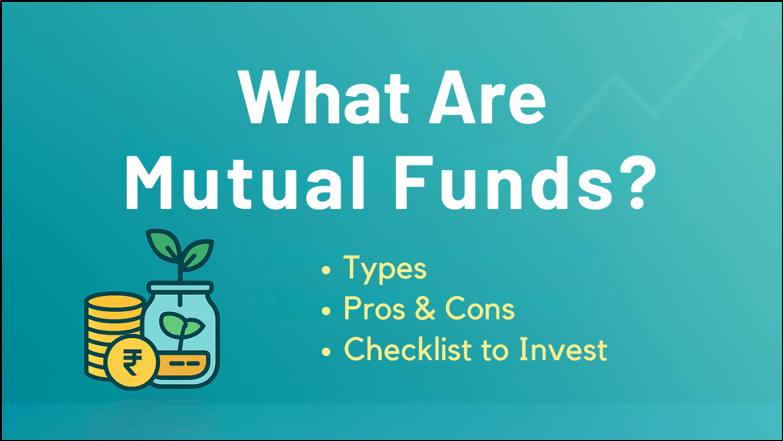Introduction
Mutual funds pool money from many investors to buy a mix of stocks, bonds, or other assets — all managed by professionals. Instead of picking individual shares, you buy into a ready-made basket of investments.
For new investors in Pakistan, mutual funds offer an easy way to enter the market with less effort and lower risk. This guide explains what mutual funds are, the main types, their benefits and risks, and a simple checklist to help you decide if they’re right for you.
What is a Mutual Fund?
A mutual fund collects money from many people and invests it in a diversified portfolio chosen by expert fund managers. Each investor owns units of the fund — not the individual stocks or bonds directly. This means you instantly get diversification, professional oversight, and the ability to invest with relatively small amounts.
Main Types of Mutual Funds
Here are the most common categories available in Pakistan:
1️⃣ Equity Funds (Growth) → Invest mainly in company shares. Higher risk, but potential for higher long-term growth. Best for people who want to grow wealth over time.
2️⃣ Debt Funds (Income) → Invest in fixed-income securities like government bonds or corporate debt. Lower risk, steady income, but returns are usually smaller.
3️⃣ Hybrid Funds (Balanced) → Mix of stocks + bonds. A balance between growth and safety. Good for beginners who want both stability and some growth.
4️⃣ Money Market Funds (Safety) → Invest in short-term, safe instruments like treasury bills. Very low risk, highly liquid, but returns are small. Suitable for parking emergency funds.
5️⃣ Index Funds / ETFs (Low Cost) → Track a market index (like KSE-100 in Pakistan). Low management fees, simple, and often perform better than many managed funds in the long run.
Why Investors Choose Mutual Funds
Many beginner and experienced investors prefer mutual funds because they offer:
- Instant diversification across multiple assets.
- Professional management & research handled by fund managers.
- Low entry barriers so you can start with small amounts.
Risks & Fees
Mutual funds are not risk-free. Their value can still go down if markets fall. Another key factor is fees — fund managers charge an expense ratio or management fee, which is deducted from your returns.
Before investing, check:
- The fund’s expense ratio (lower is usually better).
- Past performance over at least 5–10 years (though past returns don’t guarantee the future).
- The fund manager’s track record and reputation.
⚠️ Remember: past performance is not a guarantee of future results.
Simple Decision Checklist
Use this quick guide to see if mutual funds suit your goals:
- ✅ Want hands-off investing? → Mutual funds work well.
- ✅ Saving for 3+ years? → Equity or balanced funds may fit.
- ✅ Need short-term safety? → Money market or debt funds are better.
- ✅ Always check fees, past performance, and minimum investment.
Conclusion
Mutual funds are one of the simplest and most practical ways for beginners in Pakistan to step into the world of investing. They offer diversification, professional management, and flexibility, making them a strong choice for both cautious savers and long-term wealth builders. However, like any investment, they come with risks — market fluctuations and management fees can impact returns.
The key is to choose funds that match your goals: equity or balanced funds for long-term growth, debt or money market funds for stability, and index funds for low-cost diversification. Always compare fees, review past performance, and align your choice with your investment horizon.
By starting small, staying consistent, and reinvesting returns, mutual funds can help you build wealth steadily over time. They’re not a “get-rich-quick” tool but a disciplined pathway to financial independence.
- Takeaway: Begin with a small amount, learn as you go, and use mutual funds as a stepping stone toward your larger financial goals.
👉 Follow @landinpk for simple investing guides and updates on local mutual fund options.




